Bystander Ads
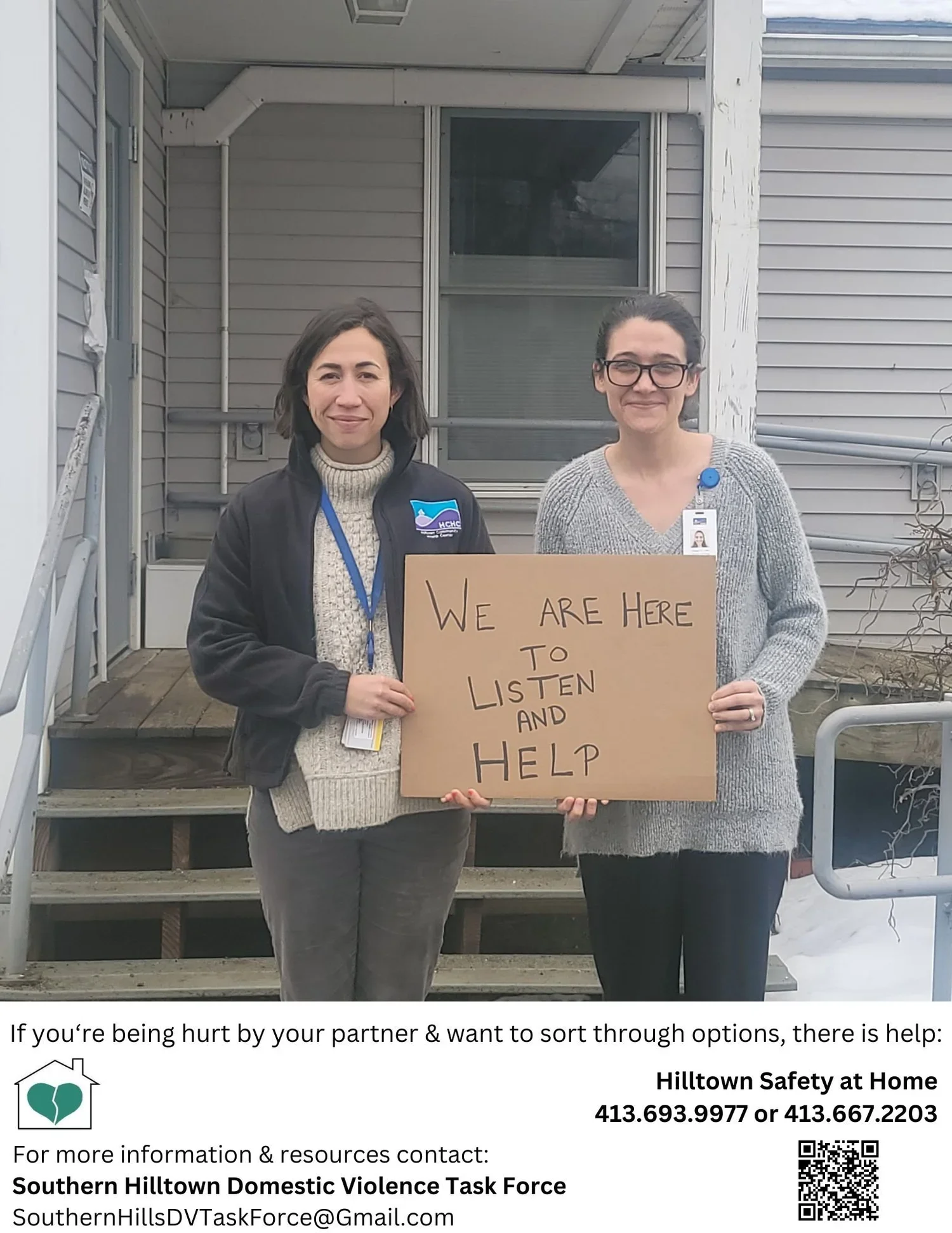
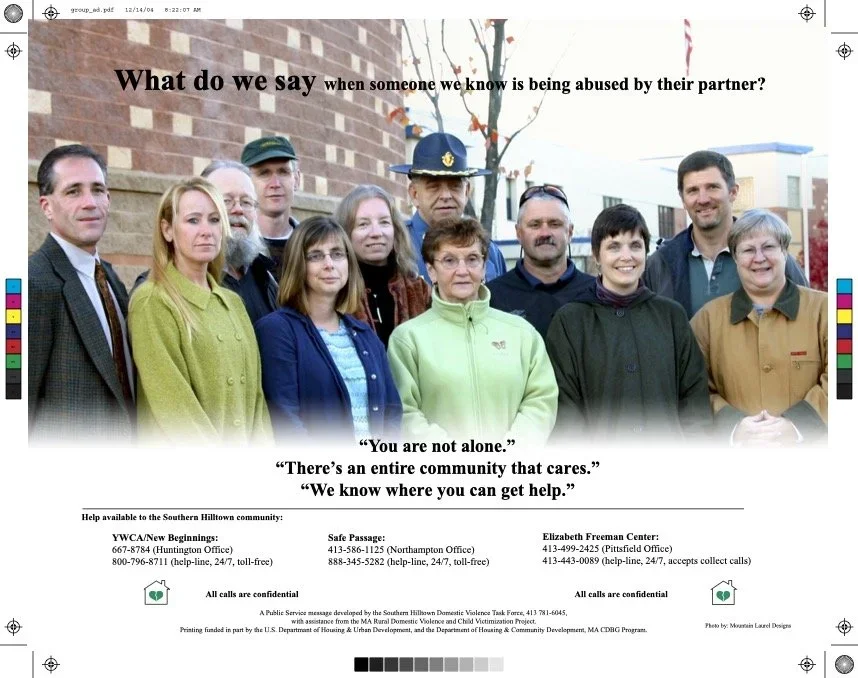
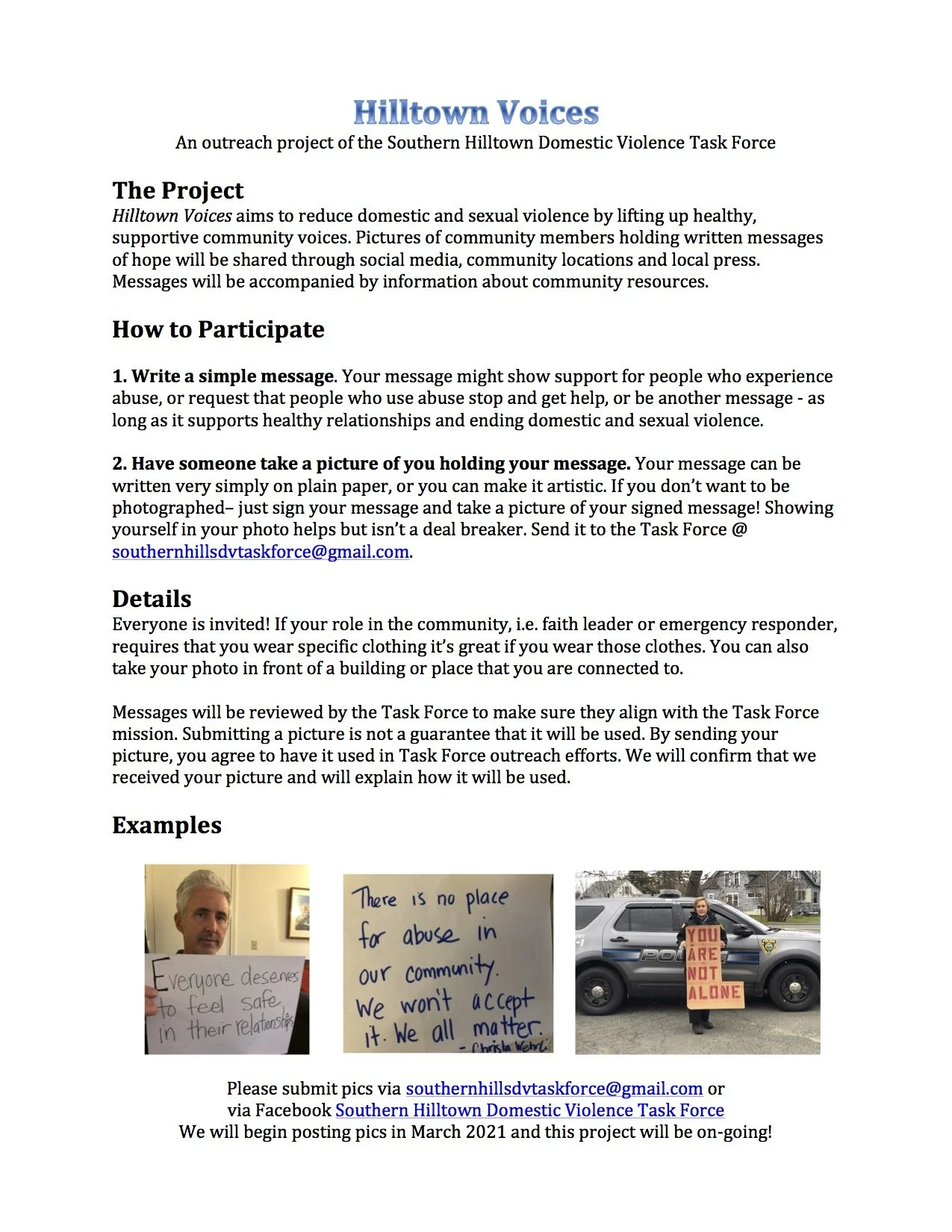
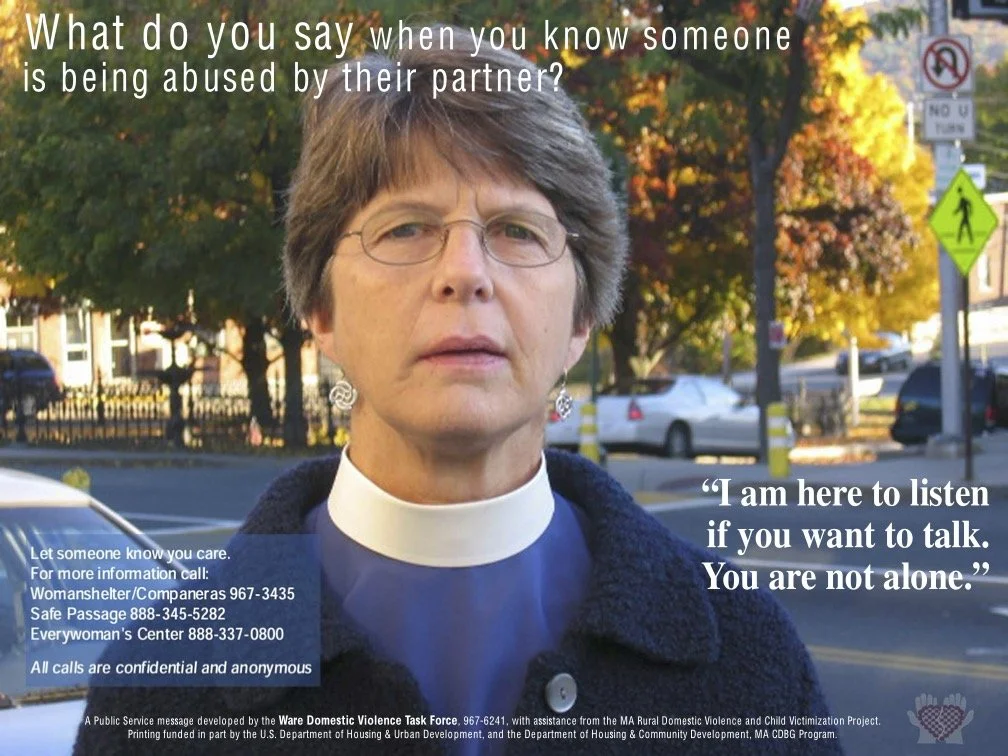
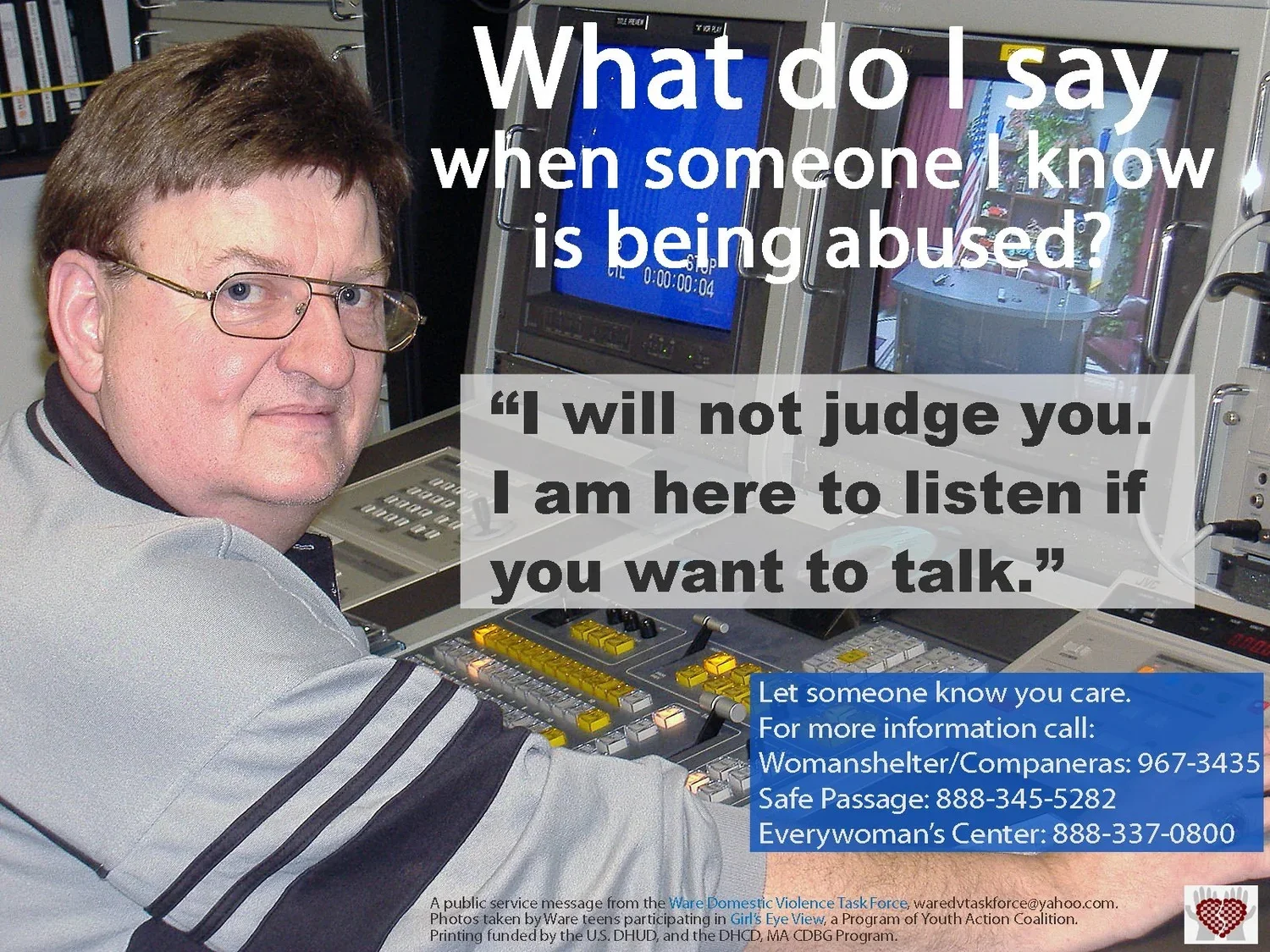
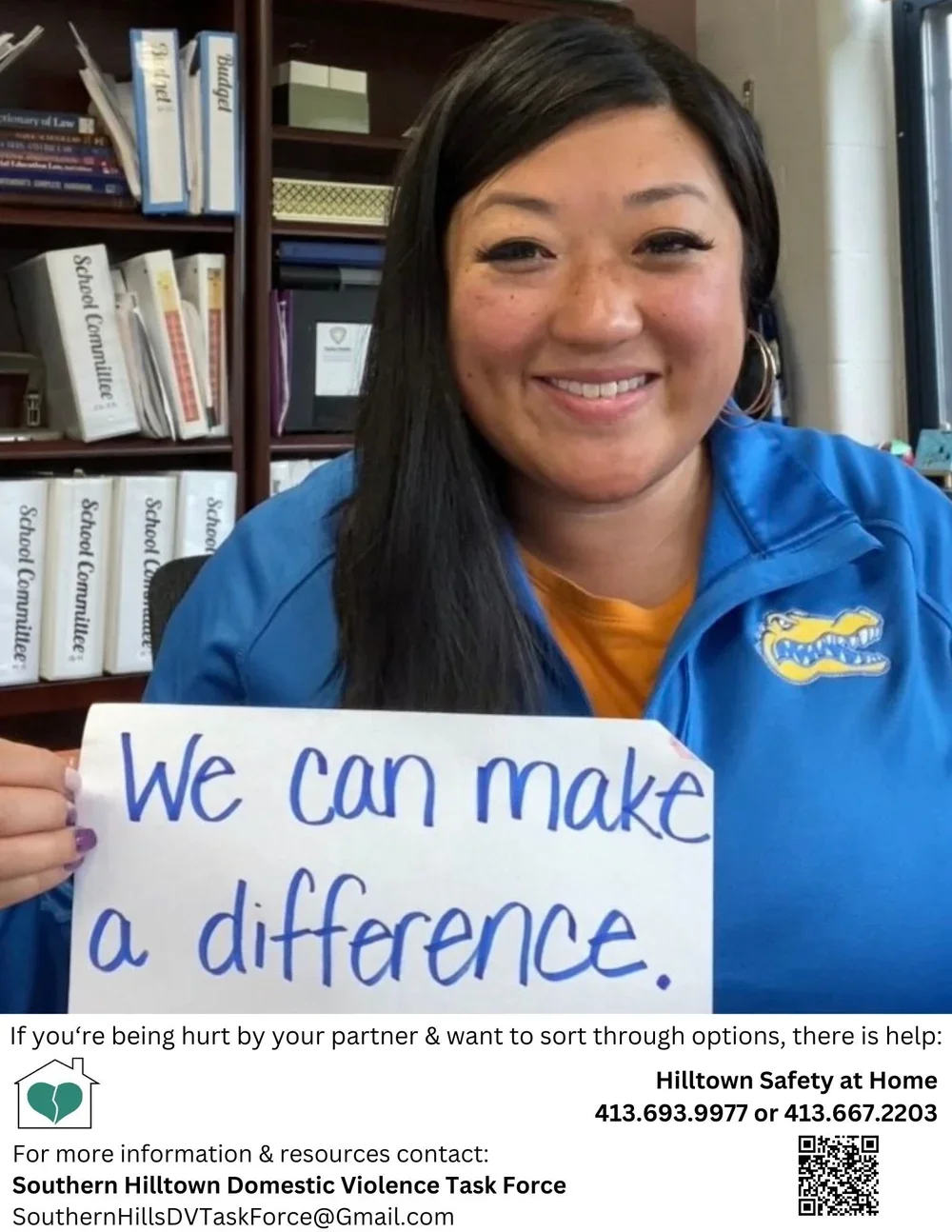
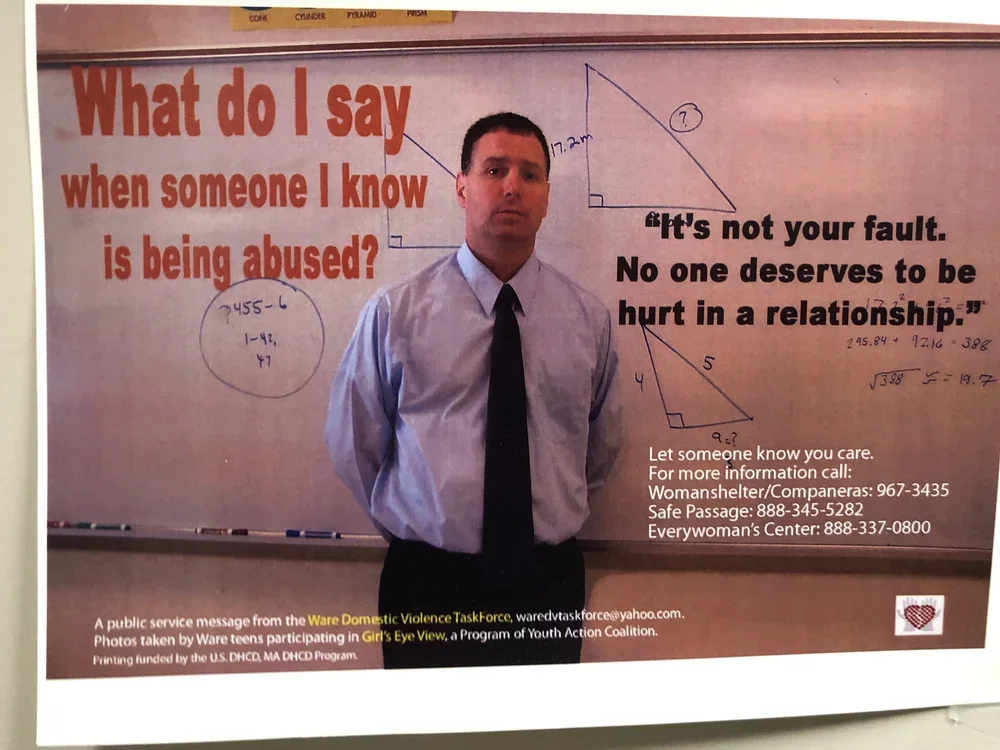
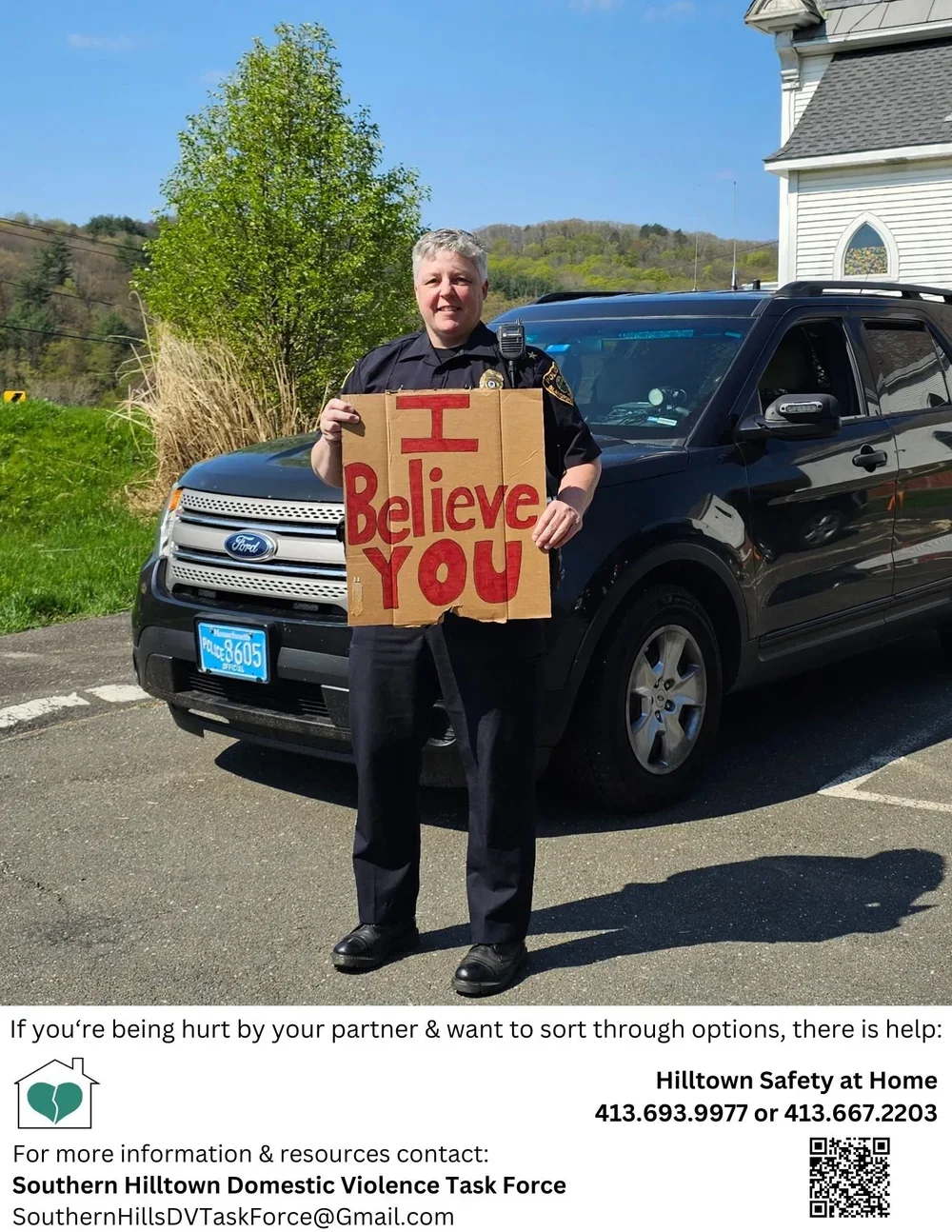
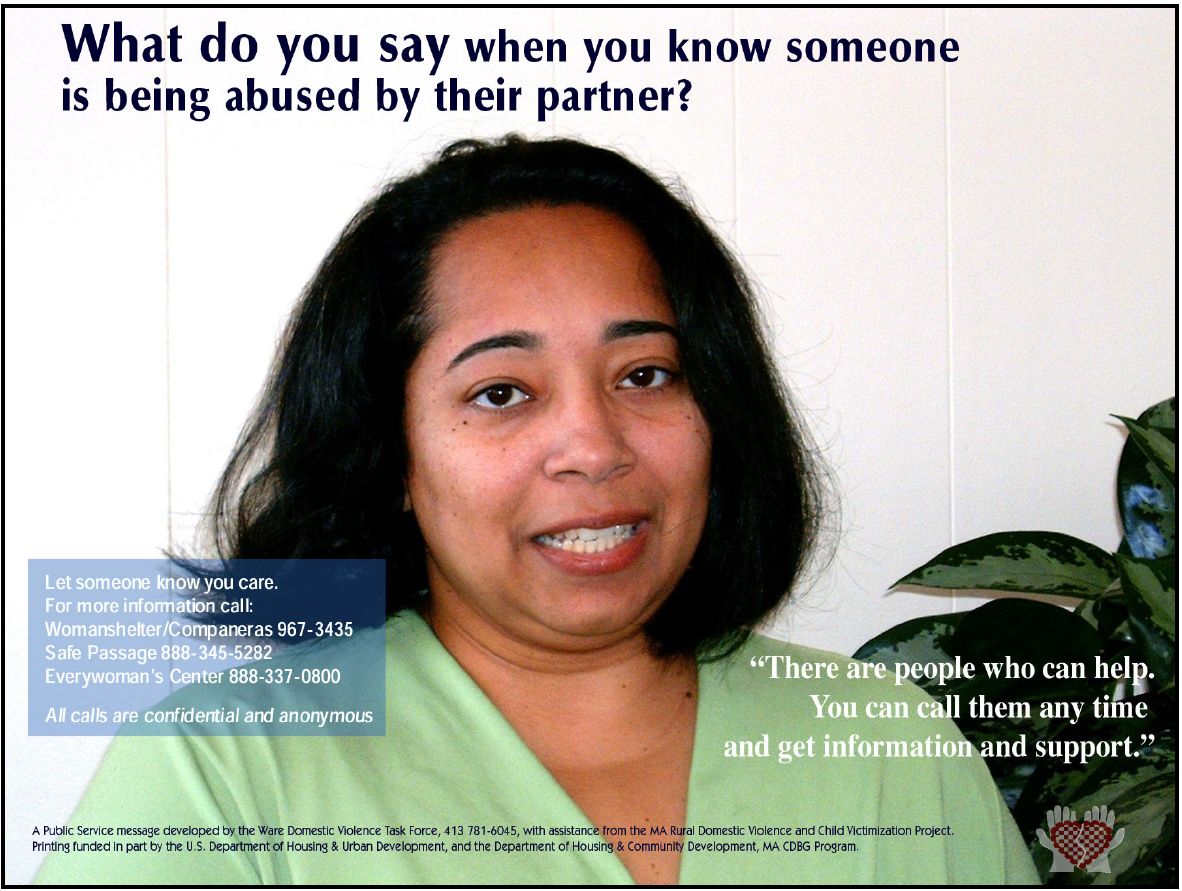
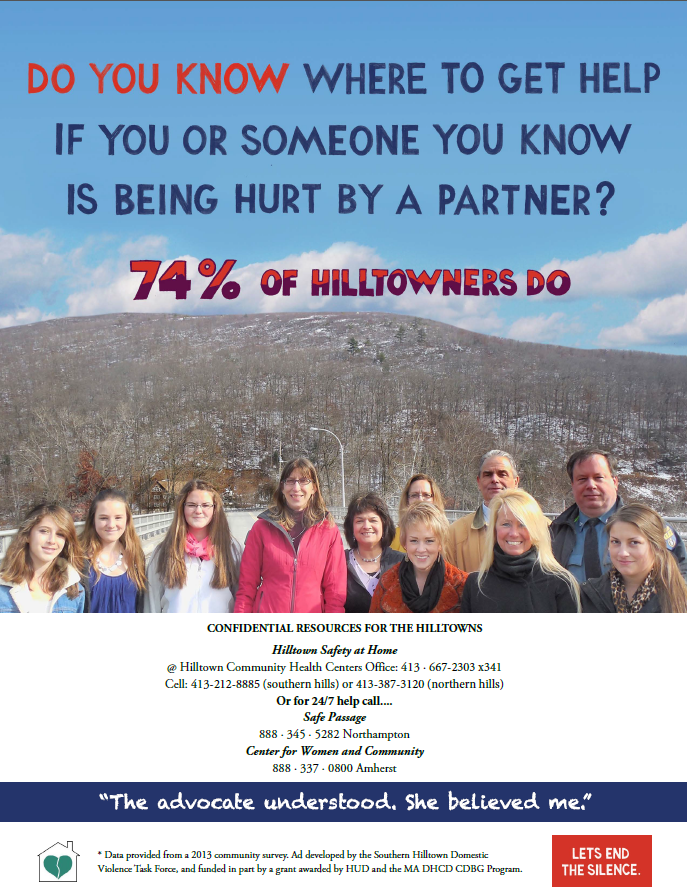
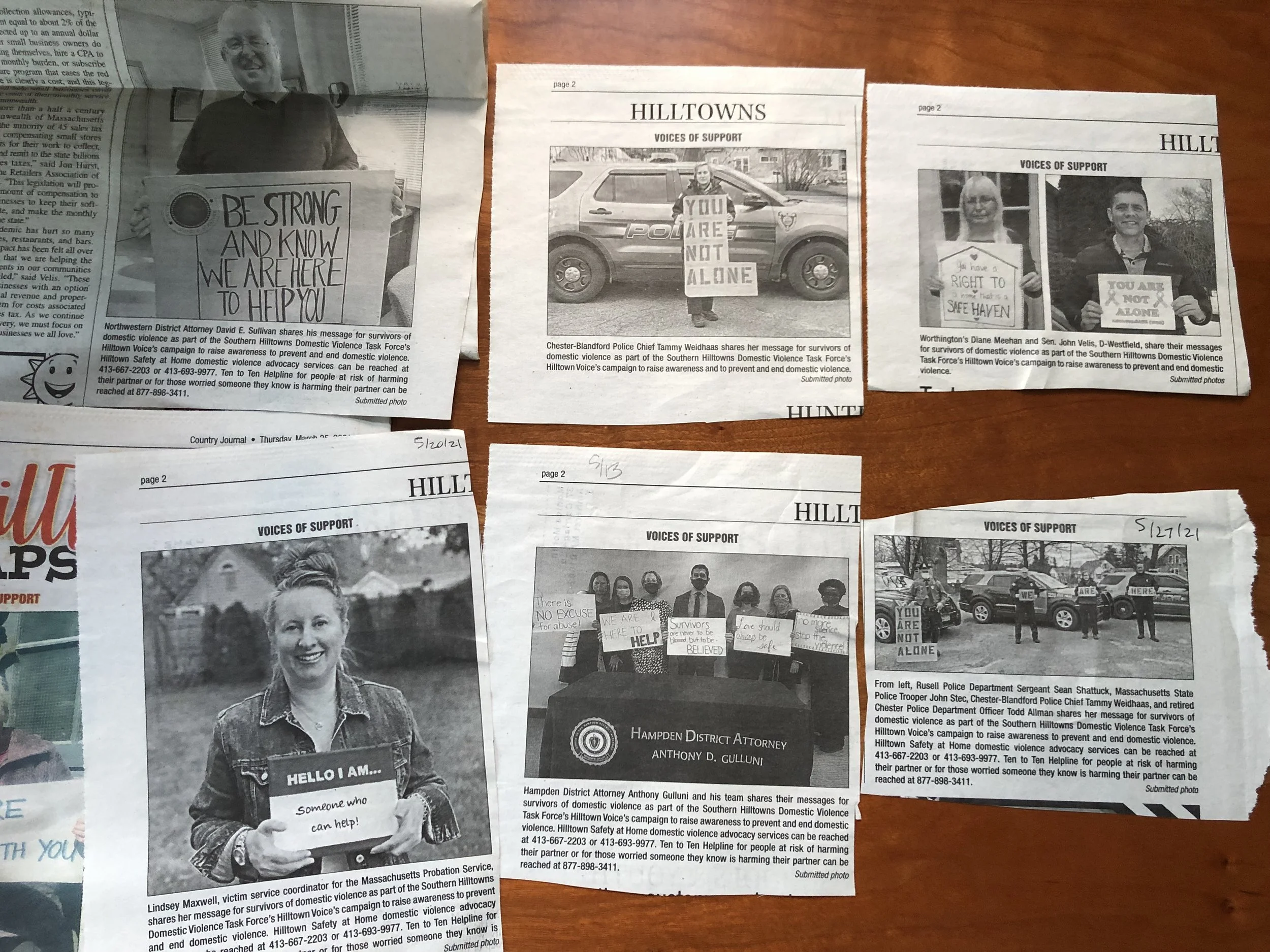
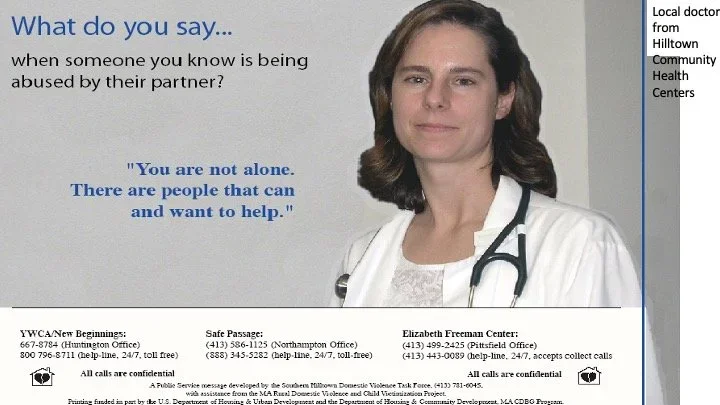
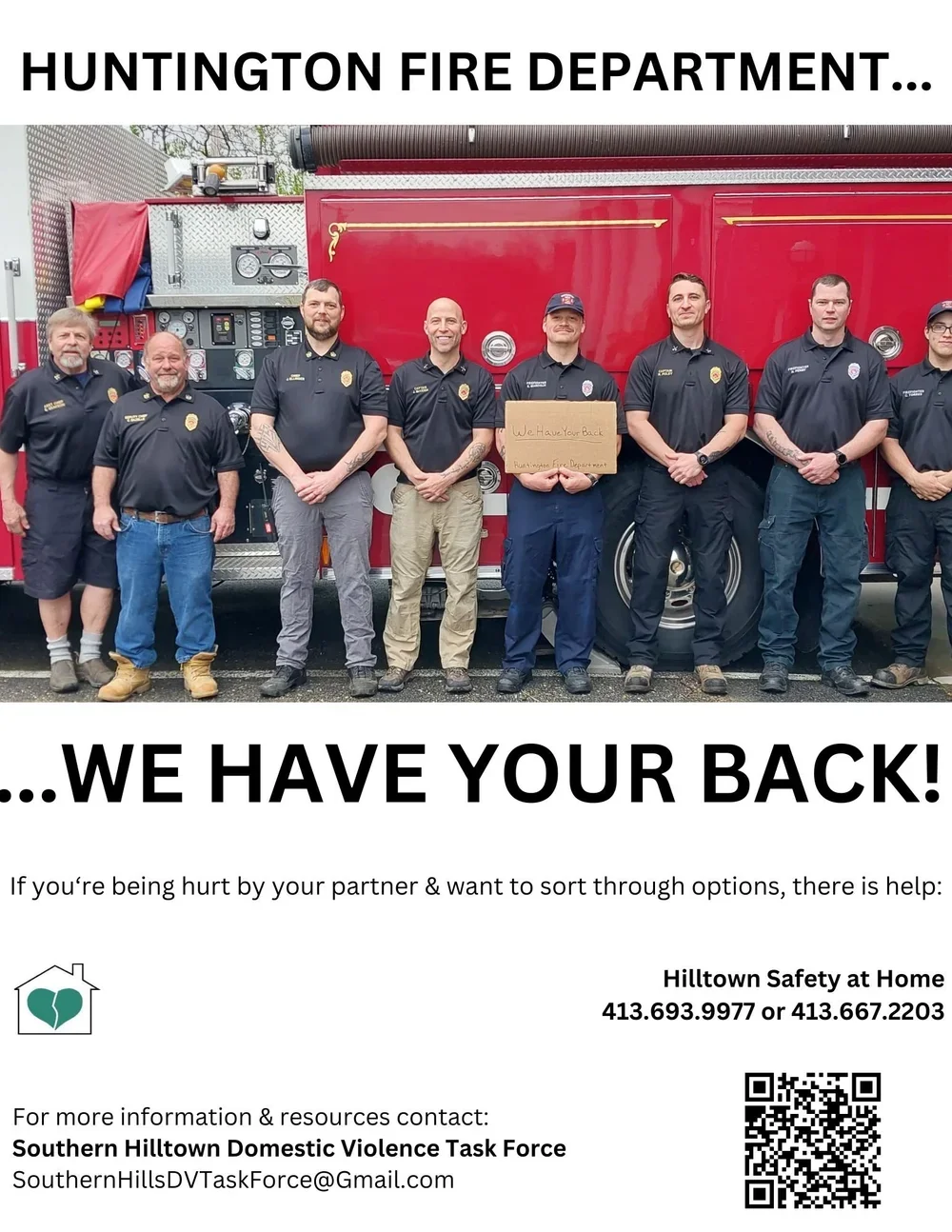
Letters to the Editor/Letters to Parents/Opinion Pieces
-
Country Journal
Letter to the Editor
March 1, 2019Submitted by the Southern Hilltown Domestic Violence Task Force
As we have witnessed once again in recent weeks, domestic violence happens in rural areas and sometimes results in serious injury, death or suicide. Our heartfelt condolences go out to the families and friends directly impacted by these recent events, and to our entire community because domestic violence hurts us all.
Domestic violence is complicated and few people are able to leave abusive relationships without help. These relationships are not about straightforward one-time incidents of abuse. The abuse is almost always part of an on-going strategy designed to establish control over a partner. It usually unfolds unevenly, with the abuse interspersed among long periods of peace. It can start out with subtle controlling behaviors or minor humiliations, and unfold over years during which children are born, houses are bought, lives are built, and promises to change are repeatedly offered.
When someone decides whether to leave an abusive relationship they are often weighing painful trade-offs. They want to leave the abuse, but do they have anywhere to go? Will their children need to leave their community school? Will their faith community blame them for breaking up the family? Has their partner threatened to harm them or their loved ones or their pets, or to commit suicide if they leave? What will they do for money? Do they have any friends left, or has their abusive partner successfully isolated them from every possible support? Is there any possibility that the relationship can be restored to what it once was or once promised? Will anyone believe them about the abuse? Abusive people often have charming qualities and are well liked. People often find it hard to believe they were even capable of harming the person they profess to love.
It becomes easy to see why it is hard to leave without help. Fortunately, help is available in the hilltowns, and it is available to everyone – of any gender, race, ethnicity, faith, ability, age, sexual orientation or identity. Domestic violence knows no boundaries. Our help should not know boundaries either.
Hilltown Safety at Home, a program of Hilltown Community Health Centers, has domestic violence advocates (413-212-8885 or 413-387-3120) that help people weigh the difficult trade-offs. Advocates also help people develop safety plans, access resources, and navigate the courts. If it is safe, advocates can provide transportation to court and can come to the home or meet in another safe location. There are also 24-hour hotlines, shelters, and support services available through Safe Passage in Northampton (888-345-5282), the Elizabeth Freeman Center in Pittsfield (866-401-2425), or the YWCA (800-796-8711 in Springfield.
If you know someone who is being abused, we urge you to reach out. Let them know they are not alone. Give them the numbers above, and offer to make the first call with them. They might not be ready – and that is their choice - but you will have made a crack in the isolation that can make it so hard to leave.
Kim Savery
Bev Henrichsen
Nicole Daviau
Stephanie Conway
Wendy Long
Phil Barry
Shannon Madden
Monica Moran
Lindsey Maxwell
Melissa Reid
Liz Massa
Dan Kennedy
Diane MeehanMembers
Southern Hilltown Domestic Violence Task Force -
To the editor, June 5, 2025
The early warning signs of an unhealthy relationship are not always obvious, especially to teens. That’s why we’re asking for help. If you know a teen, please talk to them about it.
It makes sense that teens get confused. Most relationships start out healthy enough, and if they do become unhealthy it doesn’t usually happen quickly or with consistency. There are often cycles that include bad times, followed by apologies and a return to the good times. But if a relationship is headed towards abuse, there can be important signs that can be easy to miss, especially for young people.
Intense jealousy can look like love. Possessiveness and pressure to spend a lot of time together – even at the expense of other friendships or family ties – can feel flattering. Controlling behavior can look like a partner who just wants to take care of you, make all the plans, and maybe even pay for everything. Mind games and gas-lighting can make teens feel that it is their fault if they are mistreated, and that if they only tried harder their relationship would return to how good it was at the beginning. If things go bad, a partner’s plea for loyalty can be convincing, especially when coupled with promises to change.
And leaving a relationship can become difficult. Their partner may threaten to share intimate photos or secrets on social media, to trash talk them among shared friends, or to find some other way to make them regret leaving. Their partner may plead with them to stay, saying they don’t know what they will do to themselves if their partner leaves or claiming that their partner is the only one who understands them and the only one that can help them do better.
This complexity explains in part why a 2023 survey of Hampshire county youth showed that over one-third of 12th grade students (38%) have at least one friend who has been abused by a dating partner. This is not something that is happening to just a few teens or something that can be easily dismissed. Teens need guidance, and they need this guidance whether they are being harmed, the ones causing harm, or even witnessing harm.
Many people ask us what they can do to help. Here is our answer: Talk about it. Raise the topic. Dive in.
Ask the teens in your life what they think about the relationships they see and why. These are not one-time conversations. We can use any opportunity – a song, a movie, a post – to gently raise the topic over time. It helps to listen without judgment and to add what we know little by little, rather than downloading everything we know at once. If teens disagree with us, this can be a good thing. Let them struggle with new ideas. This is often when the best learning happens. To learn more about how to have these conversations check out loveisrespect.org, a project of the National Domestic Violence Hotline that focuses on young people ages 13-26.
Research shows that one in five people who experience relationship abuse have their first experience of abuse as a teen. We have a chance to change their trajectory, one conversation at a time.
Sincerely,
Jennie Simmons Jenny Raiche Kirstin Krieger
Dan Orszulak Kirstin Krieger Monica Moran
Melissa Hutchins Sydnie Germain Mackenzie ORourke
Paula Kularski Margaret Sullivan Jacquie Jock
Erin Ballard Sawyer Blake
-
May 23, 2024
Dear Ware parents and guardians,As summer begins and young people increasingly rely on social media and phones to stay in touch, we’d like to ask you to discuss digital dating boundaries with your teens and pre-teens.
A good way to start these conversations is by asking questions. The idea is to get our teens thinking and to let them know they can talk to us. It helps to listen without judgment and to add our opinions carefully so that we can keep the conversation going.
Some questions that can help start a conversation are:
How quickly do you think someone should respond to a partner’s text? What if two people disagree?
Do you think it is okay for a partner to ask for passwords? What is a healthy way to handle this?
Do you think it is okay for people in a relationship to look through each other’s phones?
Do you think it is okay for people in a relationship to use each other’s devices, and if so when?
Do you think it is okay for someone to tell their partner who they can or cannot follow or friend on social media?
What might you do if you had a partner who demanded non-stop contact?
What might you tell a friend to do if their partner asked for private pictures?
If you were struggling with these issues, who would you talk to? (I hope you can talk to me….)
Things to remind ourselves before we have these conversations:
All communication in a healthy relationship is respectful, whether in person, on the phone, or online.
It is never okay to use words or actions to harm, control, pressure or manipulate a partner.
Even if you trust your partner completely, you do not have to share your passwords, share your devices, respond to messages right away, or do or send anything that makes you feel uncomfortable.
To test your knowledge before taking to your teen, see http://www.loveisrespect.org/#quizhome. You (or your teen) can also call, text, or chat online with Love Is Respect (1.866.331.9474, Text: Loveis to 22522, Chat online: Visit www.loveisrespect.org and click “Chat Online Now”). For help locally, call Valley Human Services in Ware at 413-967-6241 or the Center for Women and Community in Amherst at 413-545-0883.
Thank you,
Melissa Hutchins Kirsten Krieger Jennie Simmons Paul Regan Dan Orszulak Jacqueline Jock Jessica Morin Andrew Howard Ashley Higgins Leigh Grise Margaret Sullivan Cindy Raymond Jennifer Raiche Monica Moran Erin Ballard Stuart Beckley
Nancy Talbot
Members and Friends
Ware River Valley Domestic Violence Task Force -
Dear Ware parents and guardians,
February is teen dating violence prevention month. If you have a teen or pre-teen in your life, we’d like to ask you to talk to them about relationship health.
It can be hard for all of us to know what we have in a relationship. Most relationships start out healthy, and if they do become unhealthy or abusive it is often gradual. Teens often miss the early warning signs and misunderstand what their partner’s behavior means. Jealousy can look like love. Possessiveness and wanting to spend time only with you can feel flattering. Blame shifting and gas lighting can make teens feel that being mistreated is their fault, and that if they only tried harder their relationship would go back to being how good it was at the beginning.
We think that if teens and pre-teens understand the signs of a healthy and abuse early on, they will have a better chance of avoiding harmful relationships. If they are used to talking to adults they trust about relationships, we think they will be more likely to reach out if they ever do need help. If a teen is being hurt, they will need help sorting out what to do. If a teen is causing harm and they want to change, they will need help too.
A good way to start a conversation is to ask a question. You might ask a teen if they think the relationships they see at school are healthy or not, and why. Let them know what you have learned about relationships a little bit at a time, without overwhelming them. Listen more than you talk. And don’t worry if they don’t agree with you. It is when there is tension between two ideas that real learning often happens.
Below is a Relationship Spectrum that we find helpful. Two websites we recommend are www.loveisrespect.org and www.joinonelove.org
(from www.loveisrespect.org)
(over)
If you are worried your teen may already be in an unhealthy or abusive relationship, here are some more tips:
Ask questions about your teen’s life
Listen with an open mind and don’t interrupt
Ask them what they want to do and help them review their options
Remind them of their strengths
Don’t insult their partner. Instead talk about any behaviors you see that worry you and be sure to hold
them accountable if they are the one causing harm
Above all, keep communicating and try to maintain a connection with your teen
Learn more (see www.loveisrespect.org,or www.onelove.org, or contact the Task Force thru
Facebook @ Ware River Valley Domestic Violence Task, wrvdvtaskforce@gmail.com or 413-758-0506)
As always, we are grateful for everything you do to make our community healthy and safe.
Thank you,
Melissa Hutchins
Dan Orszulak
Jennie Simmons
Ashley Higgins
Paula Kularski
Andrew Howard
Monica Moran
Kirstin Krieger
Melissa Stebbins
Jacquie Jock
Erin Ballard
Nancy Talbot
Paula KularskiMembers and Allies
Ware River Valley Domestic Violence Task Force
413-758-0605
Visit us on Facebook
-
Opinion Piece: October 15, 2018
Local Faith Leaders Weigh In on Domestic Violence
The hilltown faith communities are speaking up about domestic violence, and the numbers joining us are growing. In the era of #MeToo, our efforts could not be more timely or more compelling.
We know that not everyone is clear where faith communities stand on this issue. We want to be clear. We believe that domestic violence is a human rights issue. We believe that all people are sacred and should be treated with dignity, care and respect. We believe all people should have the freedom of self-determination, and the right to be safe. If these rights are violated - in a relationship or otherwise - we consider this a violation of human rights.
We know that some people try to hide controlling, abusive and assaultive behavior by claiming that it is in line with faith teachings. We disagree. We do not believe anyone ever has the right to control, abuse or assault another person - no matter what. We do not think that any clear reading of scripture supports abuse.
We vehemently disagree with the domination model of relationships that many abusive people rely on. In this model, it is natural, right and even sanctified that one person in a relationship has more power and authority than the other. One person is served, and the other is subservient. If the subservient partner questions or threatens this power dynamic, abuse becomes justified. It becomes a necessary evil in order to re-establish the appropriate power dynamic in the relationship.
We believe in a partnership model of relationships. In this model, both people are equal, are valuable, are worthy, and are treated with dignity. Each person supports the other, respects the other, listens to the other, and shares power and decision-making. There is a give and take, a sacred partnership. People are not perfect. They have bad days and make mistakes. There is conflict in even the healthiest relationships, but these relationships are always safe. Conflict becomes an opportunity for growth. Each person’s dignity remains intact.
We are working hard to get our message out. Earlier this year, at our 2nd Annual Interfaith Vigil on Domestic Violence in Huntington, nine local faith leaders spoke about the critical role of the faith community in ending domestic violence.
They acknowledged that many women of faith stay silent about abuse due to misunderstandings about scripture. They pointed out that domestic violence is not just an assault on the body and mind, but an assault on the spirit and soul. They recognized that domestic violence strikes one American woman in four and takes a life in this country every nine hours. They pointed to the hopeful truth that no one is born abusive, meaning we can teach people to be respectful and safe. They talked about forgiveness and amends, and how real forgiveness is a process that takes time.
They ended a poignant group reading with these collective words:
LET’S BE CLEAR: There is nothing in our collective faith teachings that justifies abuse.
LET’S BE CLEAR: Our faith does not blame someone who leaves an abusive relationship for the break-up of the marriage. The person who abuses breaks the covenant, not the person who leaves because of abuse.
LET’S BE CLEAR: Faithful calls for forgiveness do not mean that anyone should ever have to tolerate abuse.
There will be another Vigil in Cummington on October 23rd at 6pm on the Community House Lawn to honor all the lives that have been lost to domestic violence this year. We also offer trainings and host community dialogues on this issue. We’d love to have you join us in any way. Help us be clear. Help us end domestic violence and work for human rights.
Reverend Carol B. Smith
Reverend Stephen Philbrick
Father Ron Sadlowski
Reverend Nick Toroni
Aimee E. Burnham
Shannon Madden
Monica Moran
Bev Henrichsen
Diane Meehan
Lori Belhumeur
Susan LeBarronOn behalf of the Hilltown Domestic Violence Interfaith Initiative.
For more information email southernhillsdvtaskforce@gmail.com
-
Opinion Piece: Task Force Talk 9/25/18
There is a reason we are having our Fourth Annual Domestic Violence Awareness Walk on Saturday, October 6th in Ware. Once you understand it, you might want to join us.
Here is the thing. People who are abusive need to think that we agree with them. And when we are silent, they tend to think we do. They cannot justify what they do if they are the only ones who think it is okay. So, according to the research, they grossly overestimate how many other people agree with their line of thinking. Then, they use their misperception to justify what they do.
This means that as a community, we have to be loud and clear about what we think. Otherwise, our silence gets misinterpreted as support.
We do not condone or support abuse. We do not think anyone ever has the right to control or abuse another person - no matter what. If someone is home late from work or from spending time with friends, they do not deserve abuse. If someone forgets to pick up the groceries or pay a bill on time, they do not deserve abuse. If someone says something that is upsetting or talks to someone we don’t want them to talk to, they do not deserve abuse. If someone stands up for their point of view, or for their right to choose how they spend their free time, they do not deserve abuse.
We vehemently disagree with the domination model of relationships that abusive people rely on. In this model, it is natural and right that one person has more power than the other. One person is more important and valuable. One person is served, and the other is subservient. If the less important partner questions or threatens the power dynamic, abuse is justified.
We believe differently. We believe people have a choice about how they view relationships and how they treat others. We believe in a partnership model of relationships. In this model, both people are equal and are equally valuable. They support each other, respect each other, listen to each other, and share power and decision-making. There is a give and take. People make mistakes and have bad days. There is conflict, but it is always safe. Conflicts get resolved, and sometimes the relationship gets even stronger once the conflict has been worked through.
We are lucky to have amazing partners in our effort. The Ware High School Domestic Violence Task Force, with more than 30 members, will help lead us at the Awareness Walk on October 6th. This incredible group of students understands, like we do, that we can’t stay silent. And like us, they work on it all year long.
These students conduct awareness campaigns that include student produced videos, student pledges to never condone violence, and annual writing prompts that ask questions like, “What makes a relationship healthy?” and “How do you know when it is time to leave?” and “Why is it important to have outside friendships in any relationship?” This Fall, they will hold their second training for neighboring high schools. They have started teaching other teens how to launch their own campaigns.
We have other critical partners. Behavioral Health Network at Valley Human Services (VHS) is at the heart of this effort. Their local domestic violence advocates help victims and survivors plan for safety and better understand their options. They drive them to court if needed. They do what it takes - and can be reached at 413-579-2924. These advocates work closely with police departments in Ware, Warren and Hardwick to make sure victims and survivors who want follow-up support get it. VHS also provide groups for men who are abusive to help them look at their behaviors and their beliefs and work toward change.
Baystate Health Eastern Region is helping too. Together, we are training local health care providers how to effectively and compassionately respond to domestic violence. A new protocol allows staff from Mary Lane Outpatient Center and Palmer Wing Hospital to work directly with local advocates. Advocates will respond to domestic violence calls from the ER immediately if they can, and within 24 hours in any case.
Our local faith community is active as well. Trinity Episcopal Church, Tri-Parish Community Church, United Church of Ware and other local churches and faith groups are working with us to build a Domestic Violence Chaplain Program. When a victim or survivor of faith wants spiritual support, we will have local faith leaders trained and ready to help out.
We are also beginning to host a series of Kitchen Table Conversations. We want to meet with small groups from the community and have informal conversations about this issue. This helps us hear what is on people’s minds - what people think causes abuse and what might prevent it. Sometimes myths about domestic violence come up, and we get the chance to examine these myths together.
We hope you can join us at our Annual Walk. We hope you can join us at a Kitchen Table Conversation. We’d love to have you join the Task Force. Any community member who wants to help end domestic violence is welcome to join us and can reach us at wrvdvtaskforce@gmail.com or at 413-758-0605.
However we do it – we want to be loud and clear. There is no excuse for domestic violence.
Column submitted by Monica Moran, Task Force Coordinator, on behalf of the Ware River Valley Domestic Violence Task. To learn more about the Task Force check out our website, www.waredvtaskforce.org.
Videos
Teen Leadership Project - Regional Collaboration.
Ware Hope Flags
Hilltowns - Interfaith Video - Hopes, Wishes, Prayers
Purple Light Campaign
Purple light instructions:
1. Use the light bulb as a front porch light or front window light – so it can be seen from the street.
2. Turn your light on every night for all October, domestic violence awareness month.
3. Save your light! This will save you the trip of picking up a light next year, and save us the expense of another bulb.
Thank you!
Ware River Valley
Domestic Violence Task Force
Visit us on Facebook
Email wrvdvtaskforce@gmail.com
Task Force Input Line: 413-758-0605
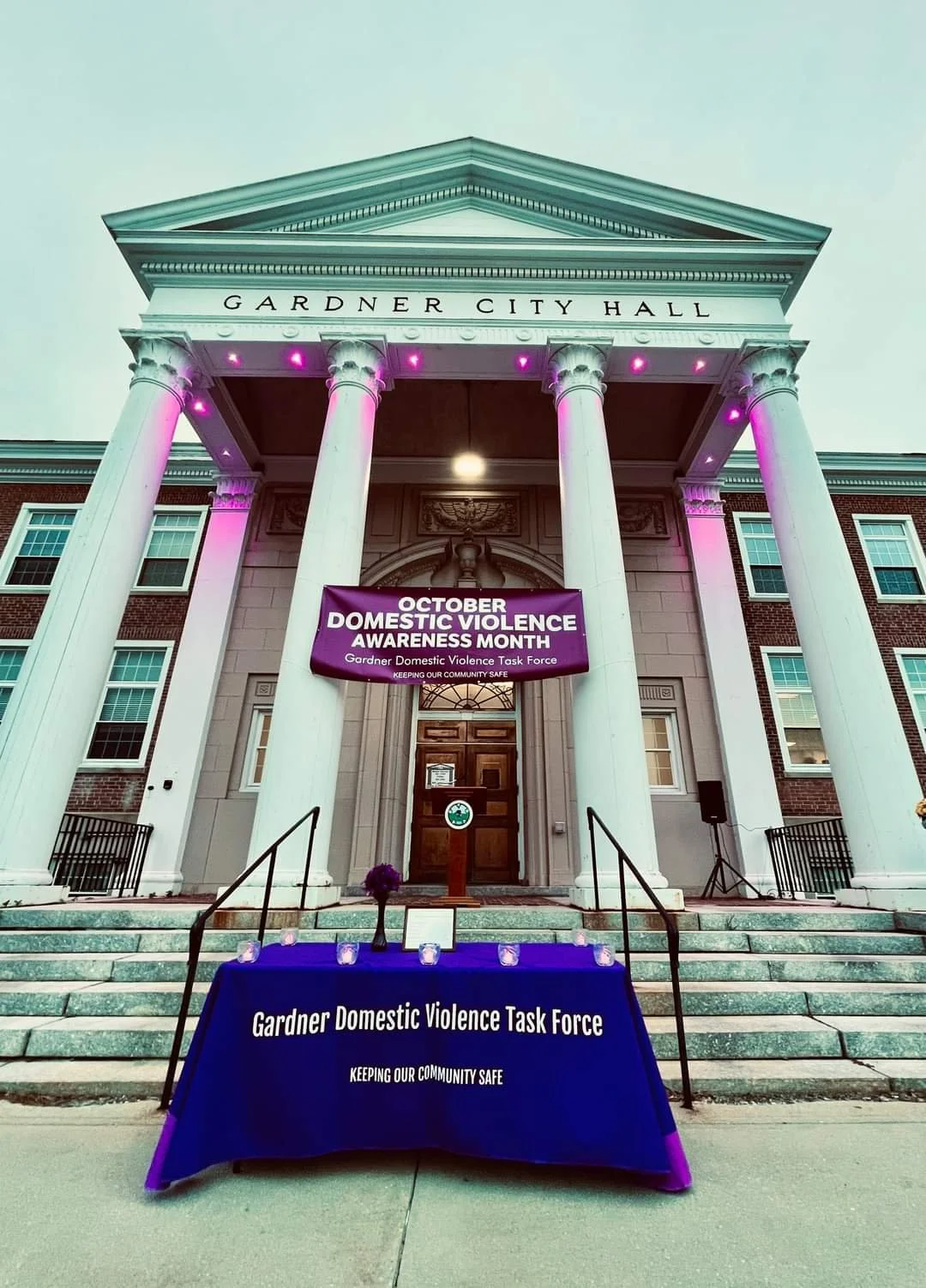
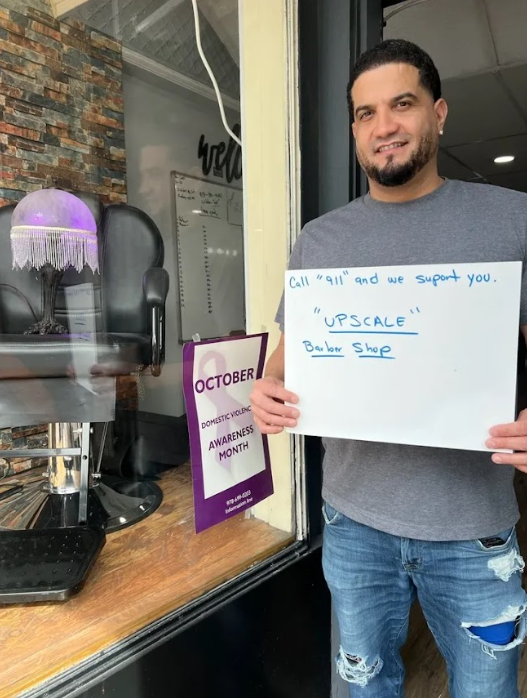
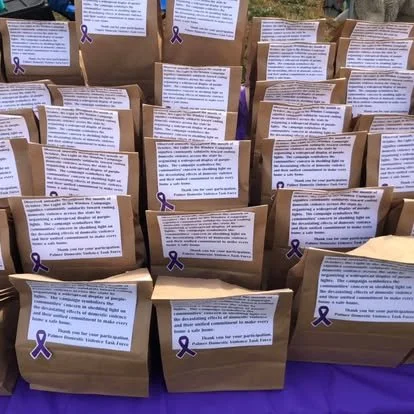
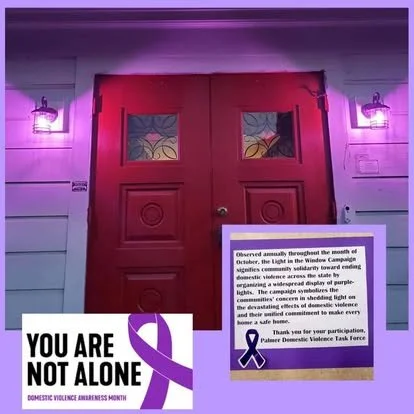
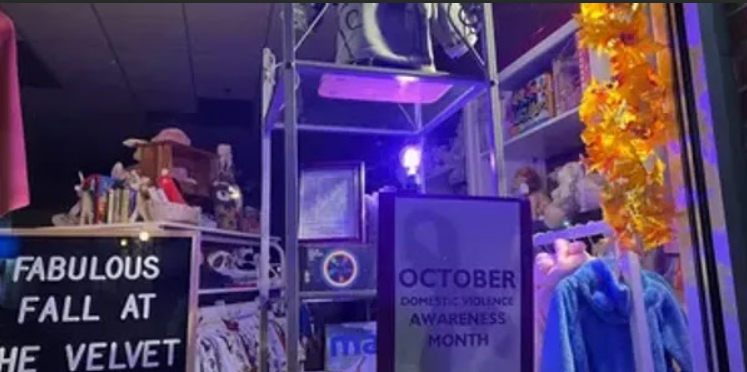
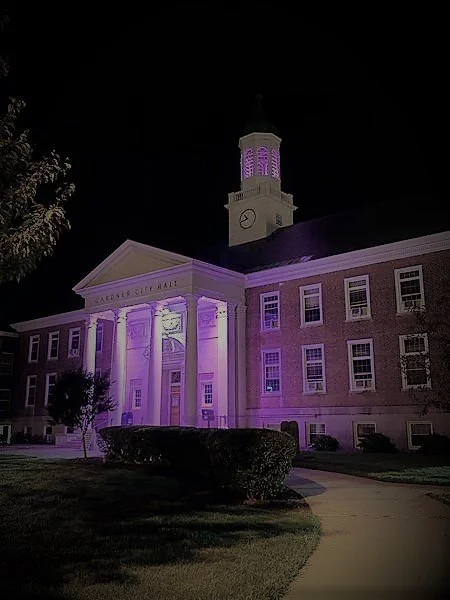
Community Outreach
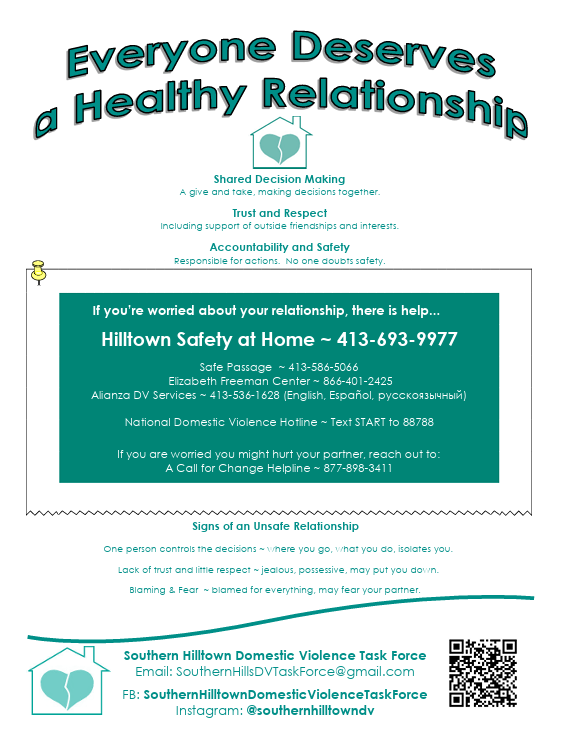
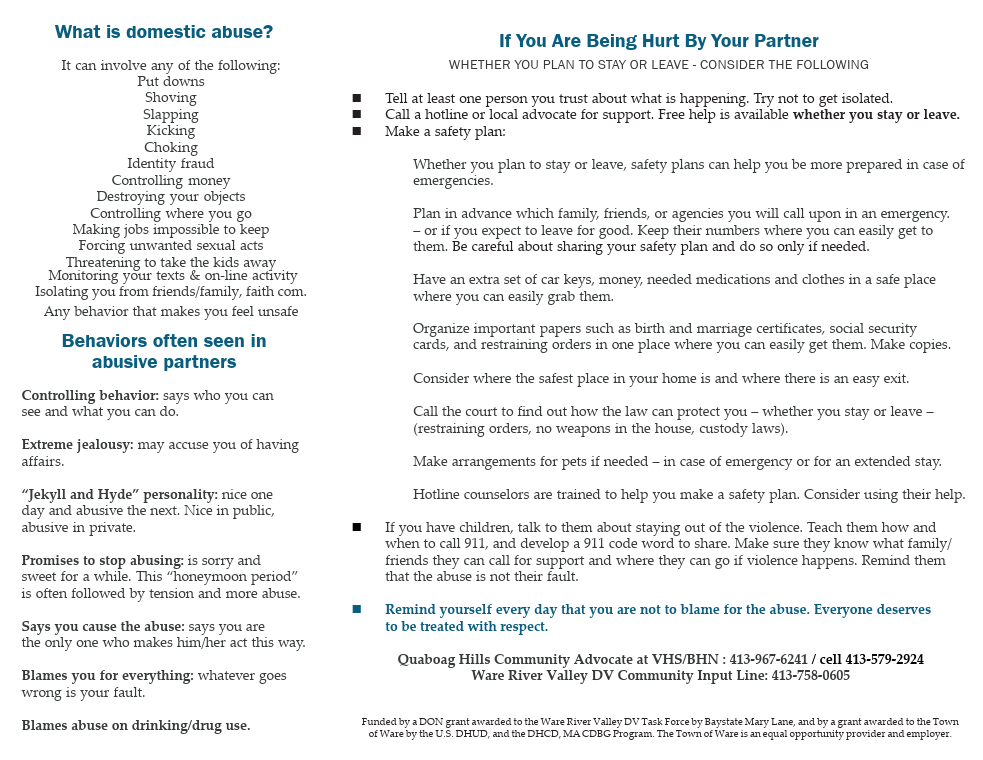
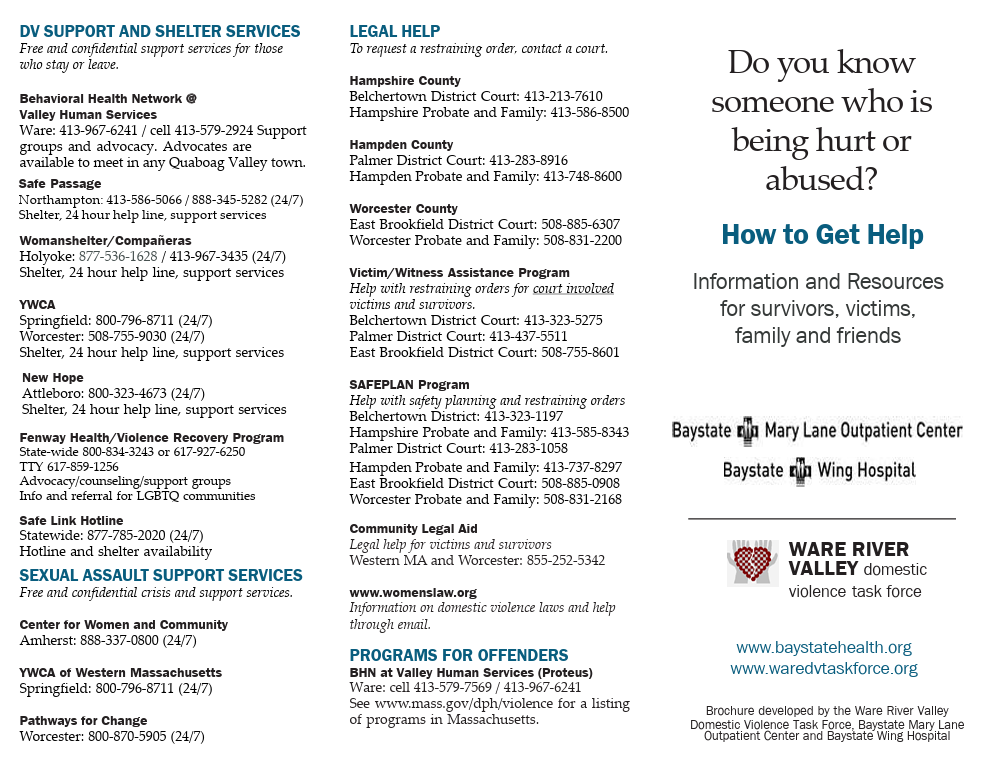
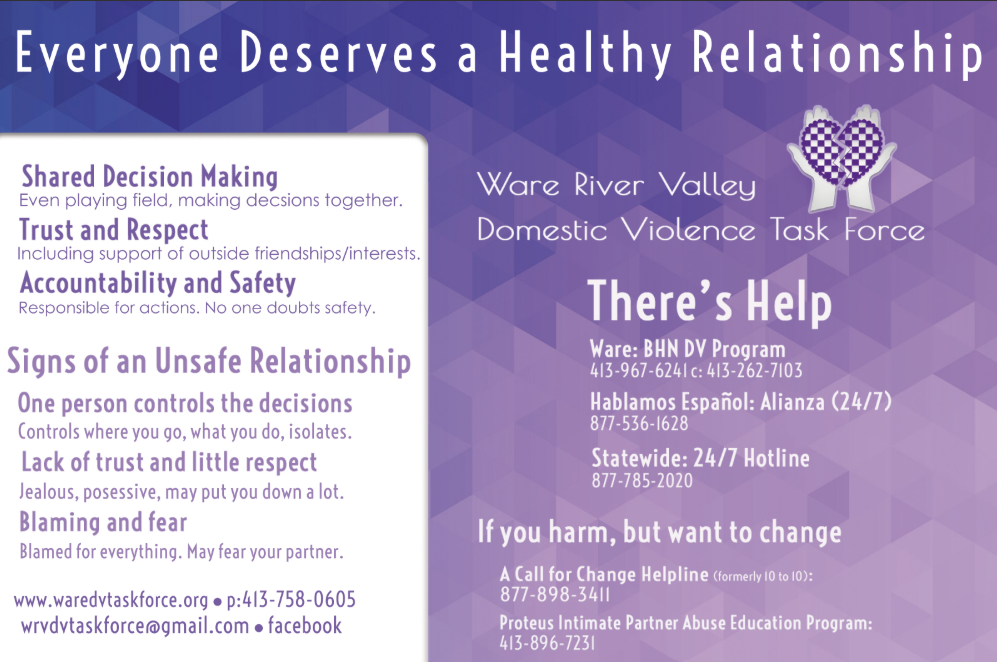
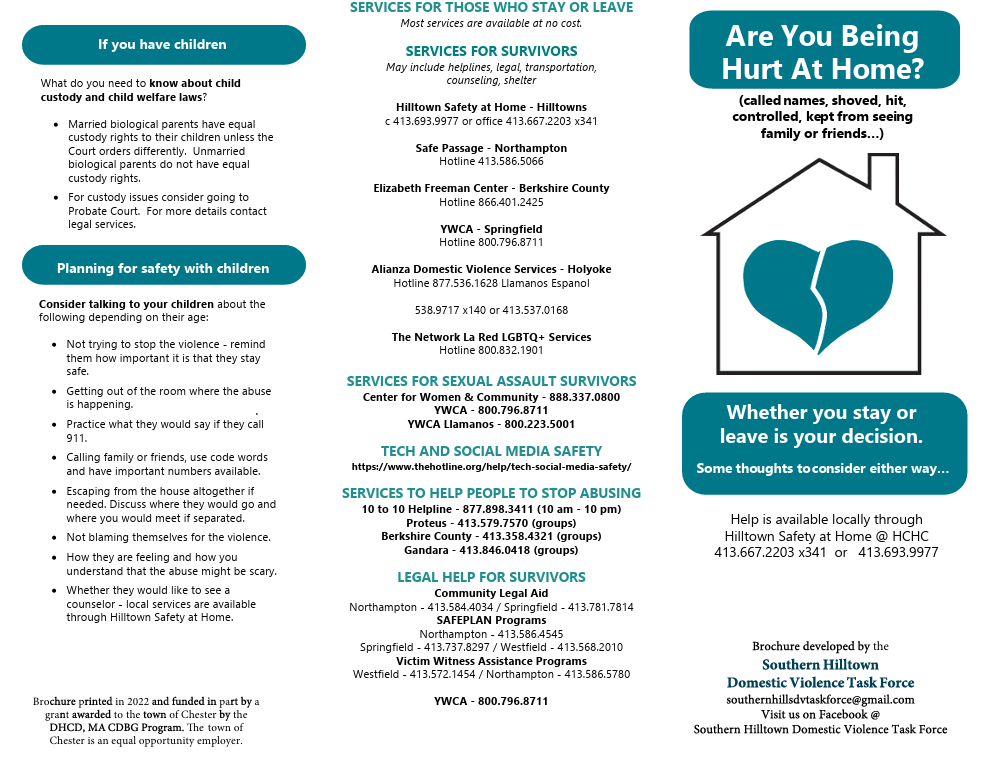
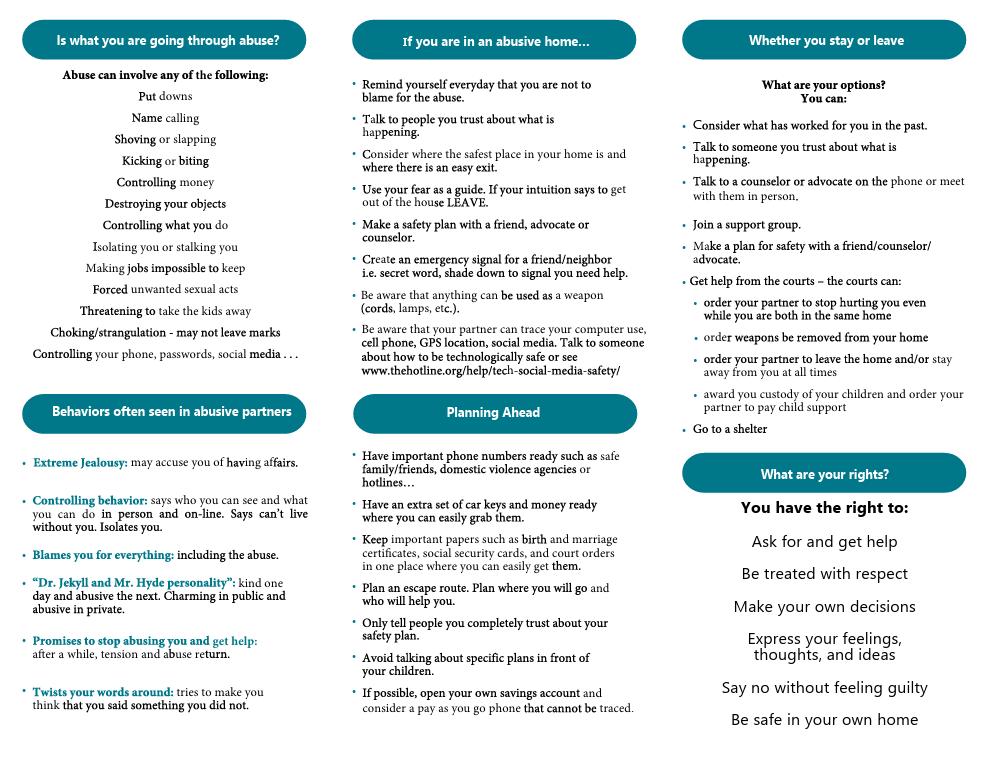
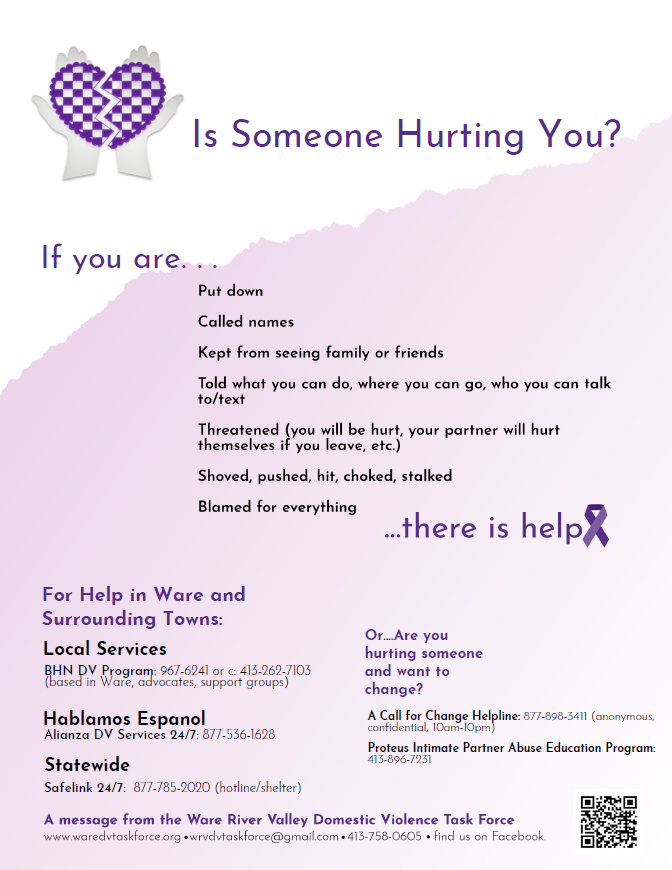
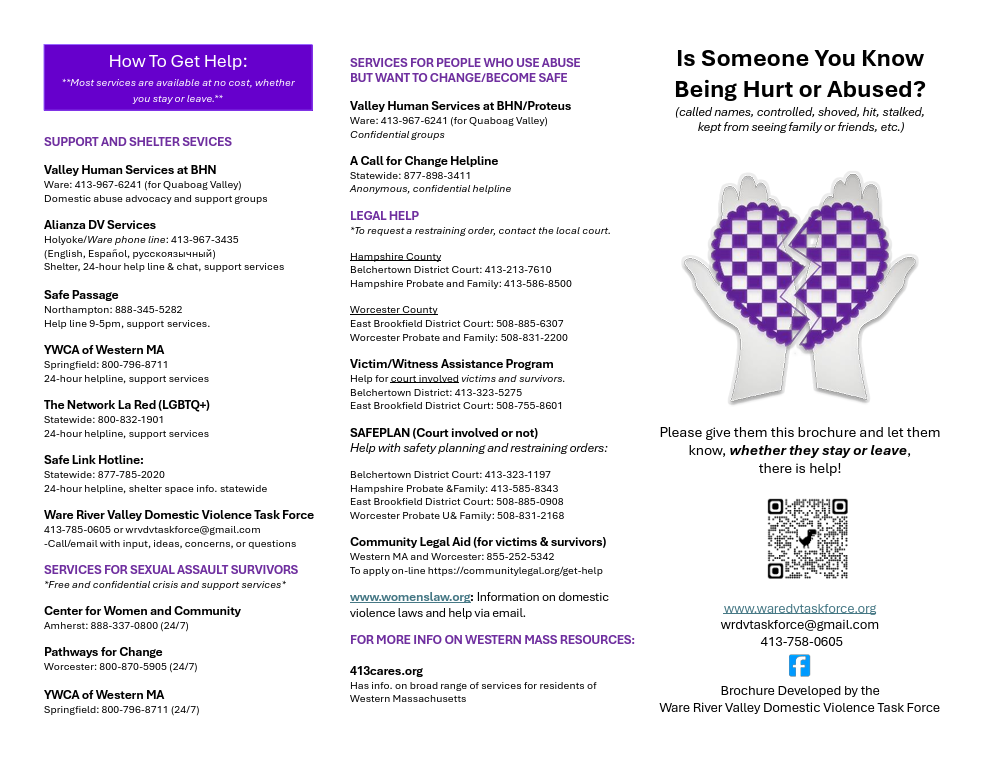
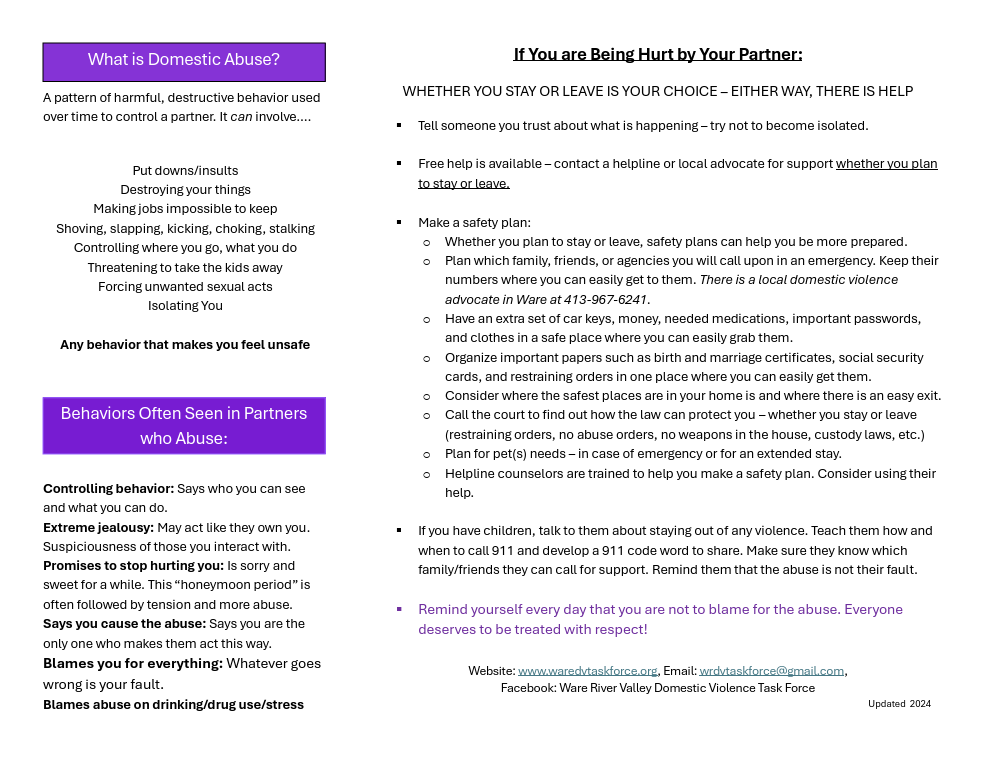
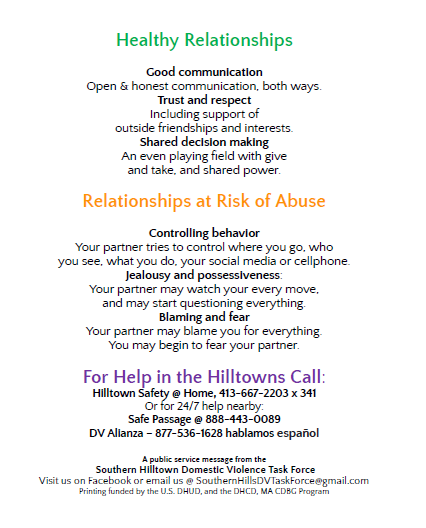
Kitchen Table - Community Conversations
Misconceptions About Intimate Partner Violence (IPV)and How Community Members Can Respond
Developed by JAC Patrissi, Director, Growing a New Heart, and by Monica Moran, Domestic Violence Prevention Projects,
Pioneer Valley Planning Commission, 2020. Updated and revised in 2023 by Monica Moran.
-
1. Why don’t they just leave?
Background: To do well, we all manage trade-offs—we need to be safe, stable, connected, and have access to resources.
Leaving a relationship means managing big tradeoffs in all these areas.
We think leaving will make us safer—but, the chances a victim will be killed sky rocket once they leave. Even if they escape abuse, they may not feel it is safe to uproot their children from school, community, family, friends or medical care givers. Will their family support them? Will their faith community support them? Will their partner carry out threats to hurt other family members or pets if they leave? Do they have the money to leave or might they face hunger and/or homelessness if they leave? Without money, where can they go? There are almost never any shelter beds available—or affordable housing. Leaving is a complex process and may not be the best solution.
Leaving can present new dangers, which can leave a victim and their children in more danger than staying.
Things to say: I know what you mean, it seems like if they just up and left, it would all be solved. I think if I had to go right now, with the money in my pocket and no access to a bank, if I had to just pick up my two children at school and leave the dog, and bring just the clothes we were wearing, knowing my partner would hurt the dog and likely hunt down the kids and I---I just would not do it. I would plan. I would weigh it out. Weigh out the trade-offs. That’s what people are doing. I wonder what we could do to make it easier for people to leave?
2. Why don’t they just get a restraining order?
Background: Most people in the field of domestic violence agree that restraining orders can either increase safety or increase danger depending on the situation.
In general, if someone has a lot to lose such as a good job or a strong reputation, a restraining order is more likely to be effective.
If someone has nothing to lose, already has a criminal history, or doesn’t care about their standing in the community, a restraining order is less likely to work.
In addition, victims often report that their abuser has threatened that if they ever get a restraining order they ‘will regret it’, or that they will harm the victim’s family members or pets etc.
Things to say: Well, when it comes down to it, a restraining order is a piece of paper with rules on it that you HOPE the abusive person is going to obey. Depending on the situation, a victim has to figure out if it will put them or their family in more danger. The victim also has to decide about the benefits of having a restraining order versus i.e possibly losing rent money their partner provides and facing homelessness. The trade-offs inherent in leaving have to be weighed. I wonder if there is anything else we can do to make it easier for people to weigh these trade-offs?
3. I just wouldn’t put up with that.
Background: Relationships rarely start out abusive. They can go on for years without abuse.
Once an abusive partner’s sense of ownership sets in, then abuse can start, even when you have not experienced abuse before. So, when you move in together, or have a baby, or get married, your risk of abuse often increases. This can explain why a seemingly good relationship can become abusive.
By the time your life is intertwined, getting out of the abusive relationship can be complicated. It can become a situation of weighing trade-offs and looking at the bigger picture of safety for you, and for your children. You might be facing abuse versus homelessness. You might be facing your abuse versus your child staying in school with a supportive teacher and close friends. You might be facing abuse versus leaving your family and life-long community and moving to a strange place with no support and no job. You might be hoping the person you loved and who loved you will return, and that the abuse will end.
You might be part of a faith community encouraging you to forgive and keep the family together. Rarely is it as simple as ‘I would just....” Thinking this way does help us protect ourselves from imagining that we could end up in this situation with no easy way out.
Things to Say: You’re definitely not alone in feeling this way. And - the reality can be a lot more complicated. If not putting up with it means leaving and being homeless, or leaving and making your kids leave their community, or losing your job, or if you’ve been threatened, or if your faith community won’t support your leaving, etc. – it can be very complicated. Most people who leave successfully take time to safety plan and leave when they think they can do it safely, have money, and feel it will be the right thing for their kids. I’m with you though! I wish victims could just up and leave and that everything would be in place for them.
4. They think being abused is normal because they grew up around it.
Background: These relationships start out looking romantic and skillful, like most romantic relationships. The abusive person is on their best behavior in the romantic stage. People are not seeking these relationships out.
What young people who are exposed to domestic violence may have difficulty with is making distinctions among what is just “poor communication skills” and what is a pattern of control.
Most people have trouble sorting out the difference—the pattern—because a pattern takes TIME to emerge. It is harder than it seems to figure out which relationships are worth keeping.
Survivors do not think it feels good to be abused.
Things to say: Well, there are definitely a lot of people who grew up around abuse. But from what I understand, abuse doesn’t usually start right away. It might be easier for some people to spot red flags early on and this is definitely an advantage. I don’t think anyone wants to be abused though. It makes me think about how to make sure abuse is not normal anywhere. How do we make sure everyone knows what red flags to look out for?
5. What they need is couples counseling. It takes two, you know.
Background: Couples counseling when there is abuse can increase danger.
Domestic violence is fundamentally about power and control. If what comes out in counseling makes the abusive person feel they are losing control of the relationship or that their partner might leave, the relationship can become more dangerous as the abuser tries to reassert power. If there is abuse in a relationship, only individual counseling is safe.
Things to say: From what I understand, couples counseling can work really well in safe relationships – but it isn’t recommended in abusive relationships because it can make things more dangerous. What people usually recommend is talking to a domestic violence advocate to sort out what is going on and how to get the right kind of help. It might look like two people hurting each other, but what advocates look at is who has more power? Who is afraid? No one is perfect. But it is usually one person in the relationship who abusing to establish control.
6. You can never tell what is happening between two people.
Background: What is going on between two people is not a TOTAL mystery. That is because the field of domestic violence has identified research-based indicators of abuse and level of risk, so even if an abusive person is not behaving illegally (being physically violent, threatening imminent violence, or sexually assaulting their partner), we CAN tell to some degree how dangerous the situation is.
For example, if one partner has a history of abusing other partners, has guns and has threatened to use them, has tried to choke or strangle their partner, has threatened suicide, or if there is an escalation of these and other abusive behaviors, risk goes up.
In some instances, when people say ‘you don’t know what is going on’ they are referring to the idea in our culture that perhaps the victim provokes or deserves or reciprocates the abuse. In this case, it may be helpful to point out that although none of us is perfect, we can probably agree that no one deserves to be abused. In addition, victims sometimes look like they are provoking abuse or being abusive when they are fighting back against an abusive partner. This is why police are required by law to ‘determine the pre-dominant aggressor’, and not just arrest both parties. This means police are required to look at each incident in the context of the history of the relationship to understand a victim’s behavior – and we can all do this.
We need to understand the context and history to understand a victim or survivor’s behavior. In terms of a victim/survivor’s reputation – how people might look down on them, we can share the reality that many abusive people attempt to ruin the reputation of their partner as a kind of insurance in case they ever decide to disclose – so that they won’t be believed. Often abusive people go out of their way to make sure everyone they know hears that the victim is “a drunk, is lazy, is a bad mom, is not reliable, etc.”
In contrast, most victims/survivors are not likely to tell anyone about the abuse unless they have a reason to believe they can trust a person. They might be repeatedly late for work, for example, but don’t explain that is because of the abuser not letting her leave on time.
We have to start from this premise: an abusive partner will tell their victim that the abuse is their fault, that no one will believe them if they disclose the abuse, and that if they leave the relationship they will be blamed for what went wrong. The abusive partner plans on the abused feeling shame, and skillfully uses this shame to keep them quiet.
Things to say: It’s true we will never know everything, but there ARE risk factors we can get good at recognizing and there is a lot we know that can help us know if someone is in danger. There are established ‘high risk’ indicators, like past violence, owning a gun, choking, etc. There are things we can do to make people safer, make communities safer. What do you think would make our community safer for people who are abused?
-
1. They probably grew up in an abusive home and abusing is all they know.
Background. Over half of perpetrators were maltreated as kids, (by witnessing violence or being hurt or threatened themselves). However, a substantial minority were not!
Abusive people see that abuse towards their partners is supported in movies, by their friends, communities. And, research shows that abusive people grossly overestimate how many other people agree with their point of view. But it doesn’t have to be this way — there is another way.
What you might say: It’s true people are more likely to become abusive if they were abused as children. But a lot of people who abuse were not abused as children AND a lot of people who witnessed violence as a child grow up to be safe. I would love to learn more about how people who witness violence growing up become safe adults. I wonder what we could do to make that more common.
2. They are not like that with anyone else.
Background: That is so true that an abuser might not be abusive to other people i.e. a boss or a brother, because they do not believe they are superior to their boss or brother or they control themselves because it works out better for them to behave respectfully with others.
Interesting, the abuser’s ability to ‘be like that’ (be abusive) with only their partner points to the fact that abuse is not about anger or impulse control, but is about a belief system that allows someone to behave abusively with select people who are viewed as less valuable.
A person is abusive because they have relationship values that lead them to believe they deserve to have more power than their partner/are superior to their partner, and have the right to humiliate or harm their partner if their partner challenges their authority or acts in a way that makes them feel uncomfortable.
They are likely to be abusive in all their intimate relationships, eventually.
What you might say: Yes, that is so interesting. I wonder if they are like that in other relationships when they have more power and think they are more important? I think it is about this idea that since they think they are more important they have a right to harm their partner. It is not like they abuse their boss! They couldn’t get away with it there.
3. They need anger management.
Background: Anger management is for people who have issues with anger and impulse control. People who are abusive are experts at controlling their behavior and their partner’s behavior. They are very precise about how they control their partner, often only using behaviors such as physical violence if it is necessary to maintain power. If threats work, only threats will be used.
Their issue is that they want power and believe they have a right to it in their relationship. Anger management will not make an abusive person stop abusing. Their belief about their right to power has to change.
Things to say: It seems like that would work. But what people who work in the field say is that people who abuse need something different – something that helps them look at their underlying beliefs that allow them to abuse. If someone is abusive to everyone – it could be about anger. But people who abuse their partner can often control their anger just fine in all their other relationships – so it isn’t really about not having the skills.
4. They are a monster.
Background: People who are abusive are not monsters. They are in fact often pillars of the community who function well in other areas of their lives, and people are often shocked to learn of their abusive behavior.
We can all think of a long list of successful and famous people convicted of abuse including politicians, actors, and beloved athletes. (Manny Ramirez, Jose Canseco, Mel Gibson, Johnny Depp, Nick Cage, Ike Turner...) They can be likable and lovable for periods of time even in their intimate relationships, and the abuse rarely starts in the beginning of a relationship. Their partner often wonders where their wonderful partner went, and stays for a time in hopes that this person will return.
An abusive person holds a set of beliefs that lead them to believe they are superior to their partner, deserve to be in control, and can harm or humiliate their partner if their partner crosses a certain line.
Things to say: The things abusive people do can feel monstrous. But they are actually just people who believe it is okay to treat their partners this way. The hope in this - is that we can work with people who abuse to change beliefs. We can’t do much with monsters.
5. They are an alcoholic/addict and that is the problem.
Background: Sixty percent of people who are abusive also have a Substance Use Disorder, (and about 60% of people with SUD are abusive!) but when they stop using, they don’t stop perpetrating violence, even if the only times they were violent were when they were on the substances.
Things to say: If they are an addict or alcoholic, then they have TWO problems, having abusive values and also being addicted. And more than half the time, people who are abusive also are addicted to something, so I can see how it looks that way. But let’s think about it this way: The substance is usually the thing that regulates a person’s emotional wellbeing—that buffers them from pain. When that buffer is gone, how do you think they do when facing the normal challenges of relationship? NOT good. Stopping using does not stop abuse because the beliefs about relationship have not changed—and addiction treatment does not address those beliefs.
6. They are crazy. (Thinking it is a mental health issue.)
Background: There is a 60% overlap between mental health, which is why it might look like it is “crazy”—also, behavior we feel is morally abhorrent we often call “crazy,” but it is not actually “crazy,” per se, it is wrong.
Things to say: I know what you mean. But actually people who are mentally ill are not violent by and large, and when they are violent, they are violent for the same reasons that people who are not mentally ill are violent—because they believe it is okay to use violence and they have family and friends who support that belief.
7. They just need help, to talk through their feelings.
Background: Most people who witness domestic violence do not become abusive. Most people who are traumatized or who have strong feelings don’t become abusive.
If someone witnesses violence or experiences trauma of any kind, it will help them to talk through their feelings—but that won’t make them stop abuse. What underlies domestic abuse is a set of beliefs, not a set of feelings.
Things to say: They do need help, but it is not a problem about feelings. A lot of us have gone through trauma, and most of us are not abusive. They need to address the underlying belief system that allows them to harm someone.
Ware DV Walks
Joint reading for Ware DV Awareness Walk, October 20th, 2024
Directions: Task Force members gather around podium/speaker. One person will read one section below and then the next person reads the next section. At the end there is a final statement read by everyone up at the podium.
Why are we here today? Why are we having a 9th annual domestic violence awareness walk?
Because even today, many people stay silent about domestic violence – often with tragic results – because of an outdated idea that domestic violence is not our business.
Because survivors of domestic violence are often shamed into silence – and we will not let this stand. No one should ever be made to feel ashamed because they were abused. Instead, survivor voices should be at the center of our efforts to end domestic violence.
Because we know that when we are silent about domestic violence, domestic violence grows and spreads.
Because in 2023 in Massachusetts, 19 lives were lost to domestic violence.
Because last year local domestic violence advocates out of BHN in Ware worked with more than 400 survivors of abuse in Ware, Hardwick, Warren and surrounding towns (some were hit, some went to the hospital, some were denied food, some were forced into total isolation, some were told God does not love them.)
Because the highest rates of domestic violence happen among young people aged 16 to 24, and we will not accept this. We know we can do better.
Because we know if we dispel harmful stereotypes that allow domestic violence to continue – like the myth that domestic violence only happens to certain people – or doesn’t happen in our town - we will reduce domestic violence.
Because we know that if we build a community based on respect, equality, and shared power, domestic violence will become less common. Who we are as a community matters.
Because domestic violence is witnessed by thousands of children every year who are then at higher risk for abuse themselves. If we end domestic violence today, we can end it for generations to come.
Because no one is born abusive. Abusive behavior is learned. That means we can teach people to be respectful and to never abuse or be violent towards anyone.
Because we need more resources. We need money for prevention, we need housing, we need more advocates. We need to make ending domestic violence a funding priority.
Because there is strength in numbers. We know we cannot end domestic violence without the help of our community. We need everyone in our community involved, not just domestic violence advocates and agencies.
(below: everyone says “LET’S BE CLEAR” together – then we continue turns for reading rest of the statement that follows LET’S BE CLEAR)
LET’S BE CLEAR: We are committed to promoting and supporting healthy relationships and ending the silence that surrounds domestic violence.
LET’S BE CLEAR: In a healthy relationship no one tries to control or dominate their partner. Power is shared.
LET’S BE CLEAR: In a healthy relationship no one owns their partner. Each person is free to make their own decisions about who they talk to, where they go, and how they spend their free time.
LET’S BE CLEAR: In a healthy relationship no one threatens or harms their partner. When there is conflict everyone knows they will be safe.
LET’S BE CLEAR: In a healthy relationship no one gas lights, manipulates or blame-shifts. Each person takes responsibility for their actions and choices.
LET’S BE CLEAR: In a healthy relationship no one calls their partner names or puts them down time and time again. They lift their partner up and remind them of their strengths.
LET’S BE CLEAR: In a healthy relationship both people are equal.
LET’S BE CLEAR: In a healthy relationship both people are safe.
LET’S BE CLEAR: In a healthy relationship each person is free to make decisions about their own life.
LET’S BE CLEAR: No one – no matter who you are, where you come from or what your background is - deserves to be abused no matter what.
This statement is read together by all readers: Together we declare we will not stay silent about domestic violence. We declare that we will stand up for safety, respect, equality, dignity and shared power. We declare that we will talk to our friends, our family members, and our community partners about how we can prevent domestic violence, and what we can do if someone we know is being abused. Together we commit to making domestic violence a thing of the past.













